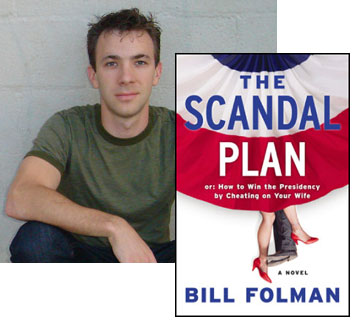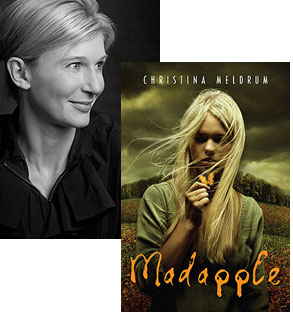Bill Folman: Making Do When Life Imitates Art Imitating Life

Every fiction writer dreams about having real-life current events unfold that mirror the themes underlying their just-published novel—but as Bill Folman reminds us in this essay, most dreams are just a few steps away from becoming nightmares. If what he has to say about trying to sell a novel about a presidential candidate whose contrived sex scandal gets out of hand while the media is obsessed with a presidential candidate with an out-of-hand sex scandal, you might want to check out the electronic preview of The Scandal Plan.
I’ve been waiting for a good sex scandal all summer long. No, I’m not a voyeur or a pervert or a committed schadenfreudist—at least not any more than is socially acceptable—but I am a political satirist with a novel to sell, and as such, the financial and humanitarian sectors of my brain are frequently in conflict.
The Scandal Plan, or: How to Win the Presidency by Cheating On Your Wife, is—not surprisingly—about a sex scandal. A fake one. It’s the story of Senator Ben Phillips, a straight-laced, over-qualified, under-exciting Democratic presidential candidate in the tradition of Al Gore and John Kerry. He’s got great ideas, but you wouldn’t want to have a beer with him—and that’s why he’s getting killed in the polls. His campaign’s brilliant solution is to invent a sex scandal. Not a big one. Just a long-ago indiscretion that can be discovered: something the senator will have learned from, something he can bounce back from, something that can humanize him, something that might make him the tiniest bit cooler. Needless to say, nothing goes as planned.
To write a political satire is to be constantly looking over your shoulder. Is my story still relevant? What if Candidate X wins? What about Candidate Y? How does today’s news affect my story? Jon Stewart has it easy. He takes yesterday’s headlines and skewers them on tonight’s show. Guaranteed freshness. With my book, it took four and a half years for the original idea to travel from conception to publication—the satirical equivalent of firing a bullet into a time machine and crossing your fingers. I don’t recommend it.
21 August 2008 | guest authors |
Christina Meldrum: Getting Fiction’s Facts Right

Christina Meldrum’s Madapple is packaged as a young adult novel, but I suspect that’s true in the same sense that Markus Zusak’s The Book Thief. (That both novels were published by Knopf’s young readers division may or may not be a coincidence.) In this essay, Meldrum talks about how she strove to make her fiction reflect the real world at a time when nonfiction chases after the dramatic allure of fiction.
Recently the melding of fiction and nonfiction has ignited controversy. James Frey’s A Million Little Pieces and Margaret Jones’s Love and Consequences were both criticized for fictionalizing events in what was presented to the public as a memoir: While Frey conceded that his core story of addiction recovery was enahnced by dramatic embellishments, Jones (real name: Margaret Seltzer) delivered an account of a half-Native American girl who grew up in a foster home and was a gang member in South Central Los Angeles when, according to Seltzer’s sister, she is white, grew up with her biological parents, and was never a member of a gang. The general consensus of readers seemed to be that memoir should be based in truth; if the story is fictionalized, it is not memoir.
But what about fiction that is based in non-fiction? Does the author of a novel have an obligation to his or her reader to make certain all non-fiction references are factually accurate? Much less consensus seems to exist on this point. Edward P. Jones wrote an account of black slave owners in The Known World; as a reader, I assumed the novel was based in research. I assumed the historical references to census data were based on actual census data, and that when Jones claimed that eight of thirty-four freed slave families in his “Manchester County” owned slaves, the figure was representative of what may well have happened historically. But these assumptions were wrong. When I finished reading The Known World and read the interview with Edward P. Jones that followed the story, I was stunned and frustrated to learn he had “made up” the census data. I felt cheated.
20 August 2008 | guest authors |

 Our Endless and Proper Work is my new book with Belt Publishing about starting (and sticking to) a productive writing practice.
Our Endless and Proper Work is my new book with Belt Publishing about starting (and sticking to) a productive writing practice. 
